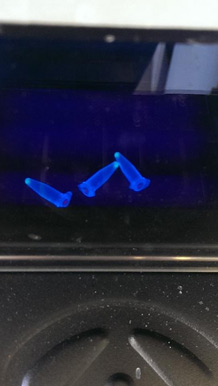
The project, called ‘Paint By COLI’ involved modifying the genes of E.coli bacteria.
Exeter students create E.coli camera for international competition
A team of students from the University of Exeter are making their final preparations before taking part in a prestigious international synthetic biology competition.
The multidisciplinary team of undergraduates will be competing against the very best of Europe at the annual international Genetically Engineered Machines (iGEM) event.
The competition, which challenges student teams to design new synthetic biological systems and operate them in living cells using an engineering approach, takes place in Lyon from October 11-13.
If they are successful at the European Jamboree, the Exeter team will travel to Boston to take part in the worldwide finals, to be held at MIT later this year.
The 2013 team comprises of a diverse group of students from the Colleges of Life and Environmental Sciences (CLES) and Engineering, Mathematics and Physical Sciences (CEMPS).
Their project, called ‘Paint By COLI’ and devised and led by the students themselves, has seen the team attempt to modify E.coli bacteria with light sensitive and pigment production genes, in order to produce a full colour biocamera.
Bio-Photography is the application of genetically engineered bacteria to act as the light sensor of a camera, replacing digital sensors or photographic film.
As the surface area of bacteria is on the order of microns, and so much smaller than a digital sensor, bio-cameras have the potential to produce images with far greater resolution than those offered by current digital photography.
This opportunity to work as an interdisciplinary group allowed the team to capitalise on the varied approaches to problem-solving taken by researchers from different fields.
With the support from The University of Exeter Annual Fund, CLES, CEMPS and academics from across the University, the group have been working on the competition over the summer. Local sixth-form students were invited to participate in the lab work through the Nuffield Research Placement Scheme, and the team held talks in the community to create awareness of the innovations in synthetic biology.
Exeter competitor Frances Entwistle said: “iGEM has given us an opportunity to take everything we've learnt at Exeter so far and show that we can take it one step further. The lab work taught me so much about working hard, responsibly and with a team; it's an experience I'll never forget and I'd thoroughly recommend it to all of my fellow students.”
Dr Elizabeth Dridge, from Biosciences at the University of Exeter, helped coordinate the iGEM project and added: “It is a fantastic opportunity for students from different subject areas to learn from each other and work together on a self directed project. Interdisciplinary research is encouraged for researchers working at the University and it’s great that we can offer this to our students as well.”
The student-led project demonstrates the University’s ambition to provide a research-led experience for all of its students.
For more information please visit the Exeter team wiki for details of their research.
Date: 9 October 2013
